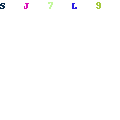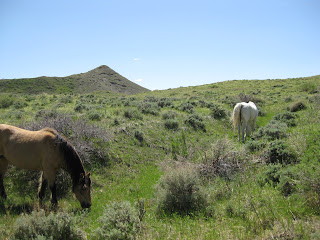Well! Books of childhood obsession? One would think YAHighway KNEW I was coming off of my gigantic degree exams and would be more than happy to get to rejoin Road Trip Wednesdays with this question. NICE.
I'm going to read "childhood" as "pre-junior high," which is probably good, since seventh grade is when I made the then-precocious, now I imagine also kind of snobby, decision to tear through banned books, and banned books only, for a year. Yeah, I was
that kid... sorry, everyone I went to school with. Sorry.
This was my first-grade obsession. It wasn't the story so much, as the fact that we were paired up as a class with sixth-grade "reading buddies," and after mine brought in magazines for the first couple weeks, I came back with this, and read to HIM.
I saw it then as a badge of honor. My precocious snobbery started early. I probably should have been more concerned (if not then, at least in later years, looking back on it) at my sixth-grader's low level of interest in reading, if not in reading itself. But at least it gave me confidence.
(And I
did have plenty of friends. I think I am usually okay at keeping my ego to myself.)

Ah,
Fog Magic. My school librarian MAILED this to me as a gift when I switched to a fancy-pants, no-grading, alternative elementary school on the other side of town in the middle of second grade. The story is nice, from what I remember, but it was the fact that the sweet old librarian at Southridge thought of me and wanted to give me a book as a personal gift that really made an impact. Because DANG, even at age eight I relished the friendship of adults over peers.
Now things get muddled, in terms of chronology. I only spent a year and half at the hippie school before being mooned by high schoolers and returning to Southridge. I'm pretty sure those two things aren't related, but all the same. My reading habits at Woods are kind of murky – a lot of
Nancy Drew, I'm sure, as I read like 150 of those, and had to find the time
sometime. There was also some book with
stone in the title, alternating POV chapters, that I was briefly obsessed with, but only because my mother read a few chapters and forbade me from reading it. So I hid it in my room. But I don't think it was very good.
In any case, at some point mid-childhood, my dad gave me
Podkayne of Mars, an old, battered, cover-falling-off copy that I fell in love with. I had completely forgotten about it until this RTW topic, so now I am SO EXCITED to go and re-read it. I didn't hit my
Hitchhiker's obsession until about age fourteen, but I have no doubt that this sowed the seeds for love of absurd sci-fi to come.
Fifth grade was a watershed year, obsession-wise. I found Jane Yolen's Here There Be Unicorns, and there was no turning back. I was serious about writing (insofar as a fifth-grader can be so) at that point, and I wrote a lovely unicorn short story that, the moment I finished it, I realized was tantamount to plagiarism. I was MORTIFIED.
But I still loved unicorns.
Also that year, I fell into the gaping, warm maw that is the
Redwall series.
Now
this was obsession. I ate those books like honeyed scones with meadowcream. And then I went onto the treacle-slow monster that was the internet at the time, found a
REDWALL RECIPE SITE, printed off more than I could handle, and actually tried my hand at recreating the gorgeous foods from the books. This is my first solo-kitchen memory, and also the one that made my mom despair over my future cooking capabilities, as I tried to bake some kind of honey oat cake that was literally:
Flour + Oats + Honey --> spooned directly onto a cookie sheet and baked.
I would like to note that since then, I have (kind of) apprenticed under a real patissiere IN FRANCE, and can make my own damn
mille feuille and
choux from scratch. So. YEAH.
(mmm, looking at those recipes is making me ridiculously nostalgic…)
On the serious side, I did also develop a real thing for
Blitzcat, about a little black cat in WWII-era Britain, surviving against all odds. I can't name what exactly was so compelling, but I really loved this, and its core images have stuck with me – so much so that I bought this Russian novel,
Путь Мури, when I was studying abroad, just because it sounded sort of similar. I haven't gotten past chapter one. My Russian isn't that fancy, and they just keep yammering on about philosophers. SO, maybe not like
Blitzcat after all.
Sixth grade: I finally hit my stride, balancing Breezy and Fun with Important and Literary.
I borrowed
Mythology 101 from my uncle's shelves, and kind of maybe kept it forever. I haven't read it in many, many years, but I felt SO COOL reading about a college kid having fantastic adventures. I don't know what the deal is about "New Adult" or whatever, but it should be more popular than it is. I mean, if QUESTAR FANTASY can find a winner...
In what was probably leading up to my Banned Books Decree of Seventh Grade, I read some real heavy hitters that year, too (
The Jungle, The Yearling, etc.), with the standout being
A Tree Grows in Brooklyn. Another one I haven't read in years, but now am anxious to return to.

But the two books that really stand out in the tail end of my childhood reading experience, in terms of obsession, are
The Mists of Avalon, and
The Princess Bride.
The former, man alive, was I not old enough to be reading. That is the kind of book a twelve-year old reads to feel hardcore, but can't ever appreciate or understand fully. It's like reading
Gone With the Wind that early – sure, fine, you are an AMAZING READER. But that doesn't make it appropriate, or you the right or most receptive audience (I'm glaring at you, haughty ivy-league girls from my Russia program…). All the same, the mere experience was important.
The Princess Bride, though… oh dear. That was it. That made me want to write. That made me want to BE. No, that sounds maudlin. I quit the hippie school long enough before that to think things like
that. But I do see TPB as a turning point in my reading/writing/thinking career. I saw the importance of story, and composition, and execution, and
humor. Oh, it was just EVERYTHING. And I adored it. And have read it enough times since then that my copy is falling apart, much like my dad's old
Podkayne of Mars. So here's to you, William Goldman. And you, Buttercup, and you, Wesley, and you, Fezzick. AND YOU, INIGO MONTOYA.
I wouldn't be the same without you.
So I'm sure that many of these are not uncommon in everyone else's pasts, but I am interested to see if ANYONE else read Fog Magic or Mythology 101, or even Cricket and the Crackerbox Kid. Or if anyone else had disastrous Redwall-recipe kitchen experiences.
Thanks, YAHighway, for another fun week!









































